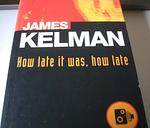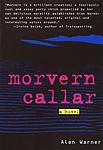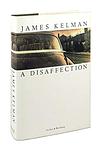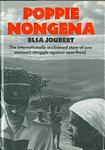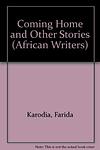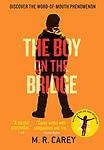The Greatest Scottish, South African "Fiction" Books Since 1970
Click to learn how this list is calculated.
This list represents a comprehensive and trusted collection of the greatest books. Developed through a specialized algorithm, it brings together 300 'best of' book lists to form a definitive guide to the world's most acclaimed books. For those interested in how these books are chosen, additional details can be found on the rankings page.
Genres
Countries
Date Range
Reading Statistics
Click the button below to see how many of these books you've read!
Download
If you're interested in downloading this list as a CSV file for use in a spreadsheet application, you can easily do so by clicking the button below. Please note that to ensure a manageable file size and faster download, the CSV will include details for only the first 500 books.
Download-
1. Disgrace by J M Coetzee
"Disgrace" is a novel that explores the life of a middle-aged professor in South Africa who is dismissed from his position after having an affair with a student. After losing his job, he moves to the countryside to live with his daughter, where they experience a violent attack that significantly alters their lives. The story delves into themes of post-apartheid South Africa, racial tension, sexual exploitation, and the struggle for personal redemption.
-
2. Waiting for the Barbarians by J M Coetzee
The novel is set in a small frontier town of an unnamed empire, where the magistrate lives a life of civil service and relative peace. His world is disrupted when the Empire declares a state of emergency due to rumors of barbarian uprising. The magistrate becomes a critic of the Empire's brutal and inhumane methods of dealing with the perceived threat, which leads to his arrest and torture. As he tries to understand his role in the vast political machinery, he also grapples with questions of power, justice, and humanity.
-
3. Lanark by Alasdair Gray
"Lanark" is an unconventional narrative that combines elements of fantasy, dystopia, and realism. The protagonist, a man named Lanark, moves through two parallel existences. In one, he's a young man named Duncan Thaw in post-war Glasgow, struggling with his artistic ambitions and personal relationships. In the other, he's Lanark in the grim, bureaucratic city of Unthank, suffering from a mysterious skin condition and grappling with his identity and purpose. The novel explores themes of love, alienation, creativity, and the human condition, presenting a complex and thought-provoking portrait of life and society.
-
4. Life & Times of Michael K by J M Coetzee
Set in South Africa during a civil war, the novel follows the journey of Michael K, a simple gardener with a cleft lip. When his mother falls ill, he attempts to take her back to her rural birthplace. After she dies en route, Michael continues the journey alone, struggling to survive in a war-torn landscape, while also being caught up in the bureaucratic red tape of the dystopian society. The story explores themes of freedom, survival, and the human spirit's resilience against adversity.
-
5. Burger's Daughter by Nadine Gordimer
"Burger's Daughter" is a novel centered around Rosa Burger, a white woman in South Africa during the apartheid era. The narrative delves into Rosa's life and struggle to find her identity, while also dealing with the legacy of her parents who were anti-apartheid activists. This story provides a deep look into the political and social climate of South Africa during a time of racial segregation and oppression.
-
6. Trainspotting by Irvine Welsh
This novel is a gritty, raw portrayal of a group of heroin addicts living in Edinburgh, Scotland. The narrative is non-linear and told from multiple perspectives, providing a deep dive into the minds and lives of these characters. The story explores themes of poverty, addiction, friendship, and the struggle to escape one's circumstances, all set against the backdrop of a bleak urban landscape. It is known for its strong Scottish dialect, graphic content, and dark humor.
-
7. July's People by Nadine Gordimer
"July's People" is a novel set in a hypothetical future where South Africa's apartheid system has collapsed and the nation is embroiled in a brutal civil war. The story follows a liberal white family who, fleeing the violence, are taken in by their black servant, July, in his rural village. The book explores the power dynamics and complexities of their relationship, as they navigate this new reality where traditional roles are reversed, and grapple with issues of race, class, and privilege.
-
8. A Dry White Season by Andre Brink
Set in apartheid-era South Africa, "A Dry White Season" follows the story of Ben Du Toit, a white schoolteacher who becomes involved in the fight against the system after his gardener's son is brutally beaten by the police. As he delves deeper into his quest for justice, he becomes increasingly isolated from his community and his family, and ultimately pays the highest price for his convictions. The novel is a powerful exploration of the devastating effects of racial injustice and the courage it takes to stand against it.
-
9. How Late It Was, How Late by James Kelman
The novel is a stream-of-consciousness narrative told from the perspective of Sammy, a shoplifter and ex-convict from Glasgow who wakes up in an alley after a two-day drinking binge to find he is completely blind. As Sammy struggles to navigate his new reality, he contends with bureaucratic systems, confronts his past, and grapples with his relationships, all while trying to understand and adjust to his sudden loss of sight. The story is a gritty exploration of working-class life, the human condition, and the nature of reality.
-
10. The No. 1 Ladies' Detective Agency by Alexander McCall Smith
The book follows the story of Precious Ramotswe, a woman in Botswana who opens the country's first and only female-run detective agency. She uses wisdom, intuition, and her understanding of human nature to solve various cases, from missing husbands to wayward daughters and con men. The story is not just about solving mysteries, but also provides a deep insight into the culture, landscape and people of Botswana.
-
11. Morvern Callar by Alan Warner
The novel follows the story of Morvern Callar, a young woman living in a small Scottish port town, who wakes up one Christmas morning to find her boyfriend has committed suicide. Instead of reporting his death, she decides to erase all evidence of it, appropriates his unpublished novel as her own, and uses his money to go on a holiday in Spain. The book explores themes of grief, identity, and personal transformation, as Morvern navigates her way through life with a detached and indifferent attitude.
-
12. Consider Phlebas by Iain Banks
"Consider Phlebas" is a science fiction novel set in a vast and chaotic universe where different civilizations and species clash. The story follows a protagonist named Bora Horza Gobuchul, a shape-shifting mercenary who becomes entangled in a dangerous mission to retrieve a powerful artifact from a religious cult. As Horza navigates treacherous alliances and battles, he also grapples with questions of identity, loyalty, and the nature of humanity. With its epic scope and thought-provoking themes, the novel explores the complexities of war, morality, and the search for meaning in a universe teetering on the brink of destruction.
-
13. Dusklands by J M Coetzee
"Dusklands" is a novel divided into two distinct parts, each examining the theme of imperialism. The first part follows a psychologically unstable American government researcher during the Vietnam War, who is tasked with developing propaganda to justify the conflict. The second part is a historical narrative set in the 18th century, exploring the violent colonization of South Africa by the Dutch. The stories parallel each other, highlighting the destructive nature of imperialism and the psychological effects it has on individuals.
-
14. In the Heart of the Country by J M Coetzee
Set in South Africa, this novel tells the story of a woman living on a remote farm who is isolated not only geographically but also emotionally and psychologically. After her father marries his young mistress, the protagonist's life spirals into madness and tragedy. The narrative explores themes of loneliness, power dynamics, and the harsh realities of life in apartheid-era South Africa, all presented through the protagonist's fragmented and unreliable perspective.
-
15. Use Of Weapons by Iain Banks
"Use of Weapons" is a gripping science fiction novel that follows the life of a skilled and enigmatic mercenary named Cheradenine Zakalwe. The story alternates between two timelines, exploring Zakalwe's dangerous missions and his troubled past. As the narrative unfolds, secrets are revealed, and the true nature of Zakalwe's character is gradually unveiled, leading to a shocking and thought-provoking conclusion. With its intricate plot, complex characters, and philosophical undertones, this book offers a thrilling and introspective exploration of war, morality, and the human condition.
-
16. Ancestral Voices by Etienne van Heerden
"Ancestral Voices" is a haunting novel set in South Africa during the apartheid era. The story follows a young boy who grows up in a small rural town, navigating a complex web of familial relationships and secrets. As he matures, he becomes increasingly aware of the racial and social injustices that surround him. The book explores themes of identity, heritage, and the harsh realities of life under apartheid, all weaved together with a deep sense of the mystical and the supernatural.
-
17. The Conservationist by Nadine Gordimer
The book is a character-driven novel set in South Africa during the apartheid era. The protagonist is a wealthy, white industrialist who buys a farm with the intention of using it as a weekend retreat. However, the farm proves to be unprofitable and difficult to manage, and the protagonist's life becomes intertwined with the lives of the black people who live and work on the land. The narrative explores themes of ownership, identity, and the struggle for meaning in a racially divided society.
-
18. A Disaffection by James Kelman
"A Disaffection" is a thought-provoking novel that delves into the mind of Patrick Doyle, a disillusioned schoolteacher living in Glasgow. As he navigates through his mundane existence, Patrick's internal monologue exposes his deep-rooted dissatisfaction with society, his job, and his relationships. Through a raw and introspective narrative, the book explores themes of alienation, identity, and the struggle to find meaning in a world that seems devoid of purpose.
-
19. Die Swerdjare Van Poppie Nongena by Elsa Joubert
"Die Swerdjare Van Poppie Nongena" is a powerful and poignant novel that tells the story of Poppie, a black South African woman, during the apartheid era. Set in the 1960s, Poppie faces immense challenges as she navigates the oppressive system that separates her from her family and forces her to endure constant discrimination and hardship. Through Poppie's experiences, the book explores themes of resilience, love, and the human spirit's ability to triumph in the face of adversity.
-
20. The Steam Pig by James McClure
In this gripping crime novel, a tenacious detective navigates the complex social and racial landscape of 1970s South Africa to solve a perplexing murder case. The story begins when a body is discovered inside a clay pig sculpture, leading the detective on a trail through the seedy underbelly of the city. As he delves deeper into the investigation, he encounters a diverse cast of characters and uncovers a web of deceit and corruption. The detective's sharp instincts and unwavering commitment to justice drive him to unravel the mystery, despite the challenges posed by the apartheid-era setting.
-
21. Fiela's Child by Dalene Matthee
The book is a poignant tale set in 19th-century South Africa, where a young white boy, believed to be lost by his biological family, is found and raised by Fiela, a compassionate and strong-willed woman of the Khoikhoi community. The story unfolds as the boy, named Benjamin, grows up with a deep sense of belonging in Fiela's family, only to have his identity and future thrown into turmoil when government officials, enforcing racial classifications of the time, remove him from his home. He is then forced to live with a destitute white family in the dense Knysna Forest, leading to a profound exploration of identity, race, and the meaning of family, as both Fiela and Benjamin struggle to reclaim their lives and assert their rightful place in a society governed by strict racial divides.
-
22. Another Country by Karel Schoeman
"Another Country" is a historical novel set in 19th century South Africa, following the life of an Irish woman who immigrates to the country. The narrative explores her experiences and struggles as she adapts to the harsh realities of a new land, while also providing a vivid portrayal of the racial, political, and social tensions of the era. The book offers a deep insight into the complexities of colonialism and the formation of modern South Africa.
-
23. Between Two Worlds by Miriam Tlali
"Between Two Worlds" is a compelling narrative that explores the harsh realities of apartheid in South Africa through the eyes of its protagonist, Muriel. The story delves into Muriel's life as she navigates the oppressive societal structures that enforce racial segregation and discrimination. Working in a Johannesburg store, she encounters a microcosm of apartheid's broader societal impacts, including the complexities of interracial relationships and the struggle for dignity and identity amidst pervasive racism. The novel poignantly captures the personal and political conflicts faced by those trapped between the traditional and the modern, the rural and the urban, in a time of profound injustice.
-
24. Coming Home And Other Stories by Farida Karodia
"Coming Home And Other Stories" is a collection of short stories that delve into the lives of individuals grappling with the complexities of identity, displacement, and belonging, primarily within the context of South African society. The narratives explore themes of apartheid, racial discrimination, and the struggle for liberation, as well as the personal challenges of family dynamics, love, and loss. Through a variety of characters and settings, the stories offer a poignant reflection on the human condition and the search for home, both in a literal and metaphorical sense, highlighting the resilience of the spirit amidst social and political turmoil.
-
25. The Bridge by Iain Banks
The novel is a surreal and complex tale that weaves together multiple narratives and genres, centered around a man who awakens with amnesia on a massive, never-ending bridge that spans an entire world. As he tries to recover his memories and understand his place within this bizarre and sprawling structure, the story delves into his past life, exploring themes of identity, mental health, and the nature of reality. The bridge itself serves as a metaphor for the protagonist's mind and the divisions within it, with various sections representing different aspects of his psyche and history. Through its intricate plot and rich symbolism, the book challenges readers to consider the constructs of the self and the intricate connections between our inner and outer worlds.
Reading Statistics
Click the button below to see how many of these books you've read!
Download
If you're interested in downloading this list as a CSV file for use in a spreadsheet application, you can easily do so by clicking the button below. Please note that to ensure a manageable file size and faster download, the CSV will include details for only the first 500 books.
Download







